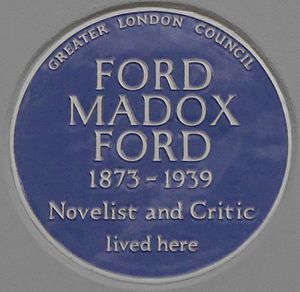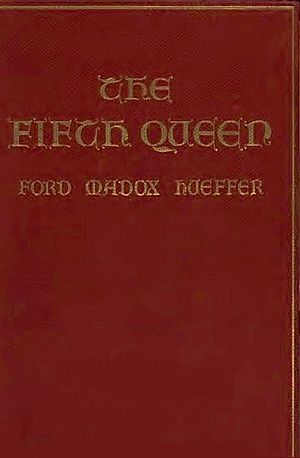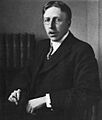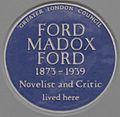Ford Madox Ford facts for kids
Quick facts for kids
Ford Madox Ford
|
|
|---|---|
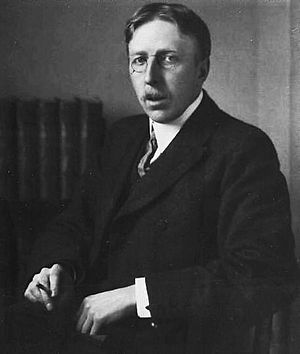
Around 1905
|
|
| Born | Joseph Leopold Ford Hermann Madox Hueffer 17 December 1873 Merton, Surrey, England |
| Died | 26 June 1939 (aged 65) Deauville, France |
| Pen name | Ford Madox Ford |
| Occupation | Novelist, publisher |
| Period | 1873–1939 |
| Spouse | Elsie Martindale |
| Partner | Violet Hunt Stella Bowen Janice Biala |
| Children | 3 |
| Relatives | Francis Hueffer (father) Catherine Madox Brown (mother) Oliver Madox Hueffer (brother) Juliet Soskice (sister) Ford Madox Brown (maternal grandfather) |
Ford Madox Ford (born Joseph Leopold Ford Hermann Madox Hueffer; 17 December 1873 – 26 June 1939) was an English writer. He was a novelist, poet, critic, and editor. His magazines, The English Review and The Transatlantic Review, were very important. They helped shape English and American literature in the early 1900s.
Ford is best known for his novels. These include The Good Soldier (1915), the Parade's End series (1924–1928), and The Fifth Queen series (1906–1908). The Good Soldier is often listed as one of the greatest novels of the 20th century.
Contents
Early Life and Family
Ford was born in Wimbledon, London. His parents were Catherine Madox Brown and Francis Hueffer. He was the oldest of three children. His brother was Oliver Madox Hueffer and his sister was Juliet Hueffer. Ford's father was German, and his mother was English.
Ford was named after his grandfather, Ford Madox Brown. His grandfather was a famous painter. Ford later wrote a book about his grandfather's life. In 1889, after his father died, Ford and his brother lived with their grandfather in London. Ford went to University College School in London. He did not go to a university.
Personal Life and Relationships
In 1894, Ford married Elsie Martindale. They had two daughters, Christina and Katharine. They lived in the countryside, first in Bonnington and then in Winchelsea. Other famous writers lived nearby, like Joseph Conrad and Henry James.
Around 1904, Ford faced health and personal issues. He went to Germany for a time to get better.
In 1909, Ford separated from his wife. He then lived with English writer Isobel Violet Hunt. They started a literary magazine together called The English Review. Ford's wife did not want to divorce him. After World War I in 1919, Ford changed his name from Hueffer to Ford. He did this partly to avoid legal problems and because his old name sounded German.
From 1918 to 1927, he lived with Stella Bowen, an Australian artist. They had a daughter named Julia Madox Ford in 1920. Later, in the early 1930s, Ford was with Janice Biala. She was an artist from New York who drew pictures for some of his books.
Ford spent his last years teaching at Olivet College in Michigan, USA. He became ill in France in June 1939 and died at age 65.
Literary Works and Themes
One of Ford's most famous novels is The Good Soldier (1915). This story takes place just before World War I. It tells the sad lives of two couples, one British and one American. The story uses many flashbacks. Ford believed that a novelist should act like a historian. He thought writers should record the events of their own time.
Ford was involved in British war efforts during World War I. He worked for the War Propaganda Bureau. This group created materials to support the war. Ford wrote two books for them in 1915. These books were about German culture and different civilizations.
After writing these books, Ford joined the British Army in 1915 at age 41. He was sent to France. His experiences in the war inspired his four-book series, Parade's End (1924–1928). This series is set in England and on the Western Front during and after World War I.
Ford wrote many novels, essays, poems, and literary reviews. He worked with Joseph Conrad on three novels: The Inheritors (1901), Romance (1903), and The Nature of a Crime (1924). Ford's The Fifth Queen series (1906–1908) is also well-known. These are historical novels about the life of Catherine Howard, a queen of England.
Ford's poem Antwerp (1915) was highly praised. The famous poet T.S. Eliot called it "the only good poem I have met with on the subject of the war."
Ford also wrote a time travel novel called Ladies Whose Bright Eyes (1911). It was revised in 1935. Like Mark Twain's A Connecticut Yankee in King Arthur's Court, it explores what happens when someone travels to the past.
During the Spanish Civil War, Ford supported the Republican side. He was against the actions of General Franco. He also disliked Mussolini and Hitler.
Promoting New Literature
In 1908, Ford started The English Review magazine. He published works by famous writers like Thomas Hardy, H. G. Wells, and Joseph Conrad. He also helped new writers like Ezra Pound and D. H. Lawrence get their first works published.
In 1924, he started The Transatlantic Review. This magazine also had a big impact on modern literature. While living in Paris, Ford became friends with other important writers. These included James Joyce, Ernest Hemingway, and Gertrude Stein. He published their works in his magazine.
As a critic, Ford had a famous tip for readers. He said, "Open the book to page ninety-nine and read, and the quality of the whole will be revealed to you." This meant you could get a good idea of a book's quality by reading just one page.
Ford was always a supporter of new and experimental writing. In 1929, he wrote The English Novel. This book gave a clear overview of the history of English novels.
Selected Works
- The Brown Owl (1892)
- Ford Madox Brown: a record of his life and work (1896)
- The Inheritors (with Joseph Conrad, 1901)
- Romance (with Joseph Conrad, 1903)
- The Fifth Queen (Part One of The Fifth Queen trilogy, 1906)
- Privy Seal (Part Two of The Fifth Queen trilogy, 1907)
- The Fifth Queen Crowned (Part Three of The Fifth Queen trilogy, 1908)
- Ladies Whose Bright Eyes (1911, revised 1935)
- Antwerp (poem, 1915)
- The Good Soldier (1915)
- Some Do Not . . . (First in Parade's End series, 1924)
- No More Parades (1925)
- A Man Could Stand Up -- (1926)
- Last Post (Fourth in Parade's End series, 1928)
- The English Novel: From the Earliest Days to the Death of Joseph Conrad (1929)
Images for kids
See also
 In Spanish: Ford Madox Ford para niños
In Spanish: Ford Madox Ford para niños
 | Sharif Bey |
 | Hale Woodruff |
 | Richmond Barthé |
 | Purvis Young |


